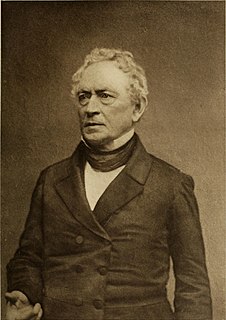Top 42 Quotes & Sayings by Edward Everett
Explore popular quotes and sayings by an American statesman Edward Everett.
Last updated on April 17, 2025.
Does it seem all but incredible to you that intelligence should travel for two thousand miles, along those slender copper lines, far down in the all but fathomless Atlantic; never before penetrated … save when some foundering vessel has plunged with her hapless company to the eternal silence and darkness of the abyss? Does it seem … but a miracle … that the thoughts of living men … should burn over the cold, green bones of men and women, whose hearts, once as warm as ours, burst as the eternal gulfs closed and roared over them centuries ago?
An earthly immortality belongs to a great and good character. History embalms it; it lives in its moral influence, in its authority, in its example, in the memory of the words and deeds in which it was manifested; and as every age adds to the illustrations of its efficacy, it may chance to be the best understood by a remote posterity.
Agriculture seems to be the first pursuit of civilized man. It enables him to escape from the life of the savage, and wandering shepherd, into that of social man, gathered into fixed communities and surrounding himself with the comforts and blessings of neighborhood, country, and home. It is agriculture alone, that fixes men in stationary dwellings, in villages, in towns, and cities, and enables the work of civilizations, in all its branches, to go on.
A great character, founded on the living rock of principle is, in fact, not a solitary phenomenon, to be at once perceived, limited, and described. It is a dispensation of Providence, designed to have not merely an immediate, but a continuous, progressive, and never-ending agency. It survives the man who possessed it; survives his age,--and perhaps, his country, his language.
The evil, Sir, is enormous; the inevitable suffering incalculable. Do not stain the fair fame of the country. . . . Nations of dependent Indians, against their will, under color of law, are driven from their homes into the wilderness. You cannot explain it; you cannot reason it away. . . . Our friends will view this measure with sorrow, and our enemies alone with joy. And we ourselves, Sir, when the interests and passions of the day are past, shall look back upon it, I fear, with self-reproach, and a regret as bitter as unavailing.
Beneath a free government there is nothing but the intelligence of the people to keep the people's peace. Order must be preserved, not by a military police or regiments of horse-guards, but by the spontaneous concert of a well-informed population, resolved that the rights which have been rescued from despotism shall not be subverted by anarchy.
We have now in our possession three instruments of civilization, unknown to antiquity. These are the art of printing; free representative government; and, lastly, a pure and spiritual religion, the deep fountain of generous enthusiasm, the mighty spring of bold and lofty designs, the great sanctuary of moral power.
The man who stands upon his own soil, who feels, by the laws of the land in which he lives,-by the laws of civilized nations,-he is the rightful and exclusive owner of the land which he tills, is, by the constitution of our nature, under a wholesome influence, not easily imbibed from any other source.
Literature is the voice of the age and the state; the character, energy, and resources of the country are reflected and imaged forth in the conceptions of its great minds; they are organs of the time; they speak not their own language, they scarce think their own thoughts; but under an impulse like the prophetic enthusiasm of old, they must feel and utter the sentiments which society inspires.




























